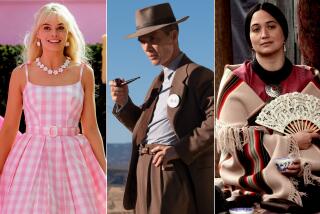Rolf Forsberg’s ‘Parable’ part of UCLA tribute on an ‘Outre World’
- Share via
Several classic feature films such as 1961’s “Breakfast at Tiffany’s,” 1950’s “Born Yesterday” and 1983’s “A Christmas Story” were among the 25 motion pictures selected last December for inclusion in the prestigious National Film Registry of the Library of Congress because they represent important achievements in filmmaking.
But not every film was a familiar title. Also making the list was “Parable,” a 20-minute religious allegorical silent short with music. “Parable” was the main attraction of the Protestant and Orthodox Center at the 1964 New York World’s Fair.
Commissioned by the New York City Protestant Council of Churches, “Parable” depicts Jesus Christ as a white-faced clown/mime, following a traveling circus on a small donkey. Christ takes on the sufferings of the circus workers, including women and minorities.
PHOTOS: Behind-the-scenes Classic Hollywood
“Parable,” written by Rolf Forsberg, who co-directed the film with Tom Rook, received laudatory reviews and subsequently earned honors at the 1966 Cannes, Venice and Edinburgh festivals.
Forsberg, 87, will be appearing Saturday at the UCLA Film & Television Archive’s tribute, “The Outre World of Rolf Forsberg” at the Billy Wilder Theater.
Besides “Parable,” the evening will feature three of his other short films: 1966’s “Antkeeper,” an allegory produced for the Lutheran Church in America, about an ant keeper who turns his son into an ant in order to save an ant colony; 1970’s “Ark,” another allegorical tale of a modern-day Noah that UCLA describes as an “expressionistic precursor” to the 1972 sci-fi cult favorite “Silent Running”; and 1972’s “One Friday,” which explores race relations.
“His work falls somewhere north of the ‘Twilight Zone’ in terms of style and tone-bold visuals, tackling complex themes with enigmatic allegory and metaphor,” said Mark Quigley, manager of the archive’s research and study center, who privately submitted “Parable” for inclusion in the National Registry. Quigley is hosting Saturday’s evening tribute.
PHOTOS: Celebrities by The Times
“I think Forsberg’s work is a unique fusion of arts cinema and classroom films,” Quigley said. “While some of his films were sponsored by major organizations like the Lutheran church, the work is secular, independent and experimental.”
“Even if it looked like I was making their statement, I could make personal statements,” said Forsberg, over the phone from his home in Sierra Madre.
Filmmakers Ingmar Bergman, Federico Fellini and Marcel Carne were among Forsberg’s inspirations for “Parable.” He also credits French painter Georges Rouault as an influence: “He was a very religious man,” said Forsberg. “He painted a lot of faces of Christ and he painted faces of clowns-their eyes were exactly the same.”
Forsberg decided to transform Christ into a white-faced mime “because that gave the audience the opportunity to project their own vision — their own image of Christ onto the face. That brought out their imaginations.”
And anger.
Before “Parable,” Jesus Christ had been traditionally portrayed in such religious epics as Cecil B. DeMille’s 1927 “The King of Kings” and Nicholas Ray’s 1961 remake and George Stevens’ 1965 “The Greatest Story Ever Told.”
“Just the concept of using allegory and the character of a mime being a Christ-type figure — nothing had really been done like that before on such a public scale,” said Quigley. “People were uncomfortable with the idea.”
One minister, said Forsberg, threatened to riddle the screen with bullets if the film was shown. “We got a threat from Consolidated Edison,” added Forsberg. “An executive there said if the film was shown, he would cut off electricity. Robert Moses, who was the head of the fair, objected to it. And he was a very powerful man.”
But cooler heads prevailed and “Parable” became one of the most popular attractions at the fair. “It’s had a very long life in 16-mm distribution to civic groups and churches,” said Quigley.
Forsberg is still amazed at his little film’s longevity. “We had no idea that there was going to be life for the film after the fair,” he said.
--
‘The Outre World of Rolf Forsberg’
Where: UCLA Film & Television Archive, Billy Wilder Theater, 10899 Wilshire Blvd., Westwood
When: 7:30 p.m. Saturday
Admission: $8 to $10
Information: https://www.cinema.ucla.edu
PHOTOS AND MORE
VIDEO: Upcoming summer films
ENVELOPE: The latest awards buzz
PHOTOS: Greatest box office flops
More to Read
Only good movies
Get the Indie Focus newsletter, Mark Olsen's weekly guide to the world of cinema.
You may occasionally receive promotional content from the Los Angeles Times.









